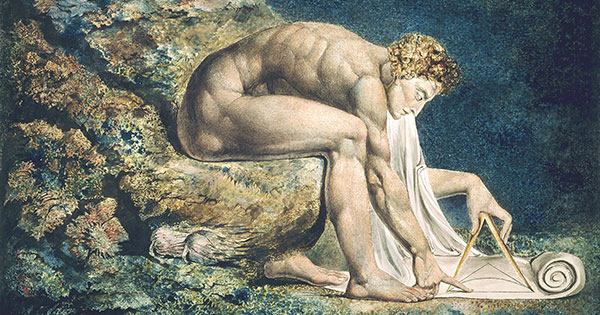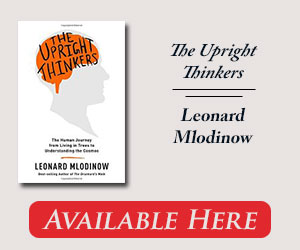
The Upright Thinkers: The Human Journey from Living in Trees to Understanding the Cosmos, by Leonard Mlodinow, Pantheon, 340 pp., $27.95
Take a moment to consider some of the marvels of modern civilization: central heating, airplanes, glass-clad high-rises, and MRI machines. Then thank the accountants of the ancient world for every last one of them. The earliest mass settlements turned into towns and cities when workers started specializing, becoming bakers, builders, weavers, and the like, freeing everyone from having to do everything. A functioning system was contingent on the efficient storage and trade of grain, and a guild of number crunchers and proto-spreadsheet users to track it. Their notation system developed into written language and mathematics.
As Leonard Mlodinow points out in The Upright Thinkers, his latest history of science, we could not have made our first modest forays into understanding the cosmos, let alone those tremendous leaps forward called the Renaissance and the Enlightenment, without organized symbols. The very idea of science would have shriveled on the vine of human curiosity if not for many other, much later inventions as well, such as movable type and the large-scale production of paper—both essential for sharing ideas with many, many other thinkers. Science arises from the cooperation and competition resulting from human interaction. Our large brains evolved to handle complex social situations, not to invent calculus—the latter would have been impossible without the former (Newton’s notorious introversion notwithstanding). “If I have seen further it is by standing on the shoulders of giants” was how Sir Isaac acknowledged his indebtedness to his predecessors. He became a giant himself, of course, so it is perhaps easy to think he sprang forth like Athena from Zeus’s cranium.
“[T]he great scholars of 1550 to 1700 who built the grand cathedral of knowledge whose pinnacle was Newton did not emerge from nowhere,” writes Mlodinow. “It was the medieval thinkers at the early universities of Europe who did the backbreaking work of digging the foundation for them.” An exploration of this four-dimensional cognitive food web forms the basis of his book, which, particularly in its opening chapters, brings a swell of humanistic pride to the reader’s chest. Mlodinow is witty and eloquent, and positively rhapsodic about people who will do almost anything to figure things out. We are indeed a very curious species, even when other concerns—like short- or long-term survival—are at hand. (Mlodinow tellingly opens with a moving anecdote about his father’s experience in a concentration camp, trading a precious crust of bread for the solution to a math problem.)
The Upright Thinkers grapples with the philosophy of scientific thought, addressing the sometimes wide differences in technological achievement among various societies, past and present. Social values, such as strong adherence to tradition or emphasis on conformity, often serve to stifle scientific and technical progress. Although a mind cannot be caged, critical thinking can be suppressed, sometimes brutally. Witness the common authoritarian practice of cracking down on intellectuals. The English Enlightenment came about because brilliant men toppled existing “truths” without fear of being pilloried or worse, as they surely would have been only decades before.
There are few imperfections in this excellent book, yet they are worthy of note. Among them is Mlodinow’s bias in favor of his own field, theoretical physics. He devotes little more than a chapter to natural scientists such as Darwin and Linnaeus, pays more enthusiastic attention to the heroes of alchemy and chemistry, and concludes with 65-odd pages on 20th-century physics, mostly the quantum mechanics of Einstein, Planck, Bohr, Heisenberg, and others. A fuller exploration of how well we understand “the cosmos”—which does, after all, include Earth, a biosphere—would have given more recognition to the role of living systems, and the men and women who study them.
Finally, is it necessary for a scientist to write of “the nobility of the human race” and “our uniqueness as a species” in this day and age? As glorious as our accomplishments have been, an unquestioning belief in human ingenuity (what conservation biologist David Ehrenfeld calls the arrogance of humanism) has led us down some very dark roads indeed—nuclear weapons being the most obvious example, impossible without Bohr’s brilliant model of the atom. Since culture gave birth to science and its wonders, it should likewise ensure that its brilliant child never forgets the value of humility.
Those points aside, The Upright Thinkers is an inspiring, exciting exploration of how our very inquisitive species has attempted to comprehend the cosmos.


